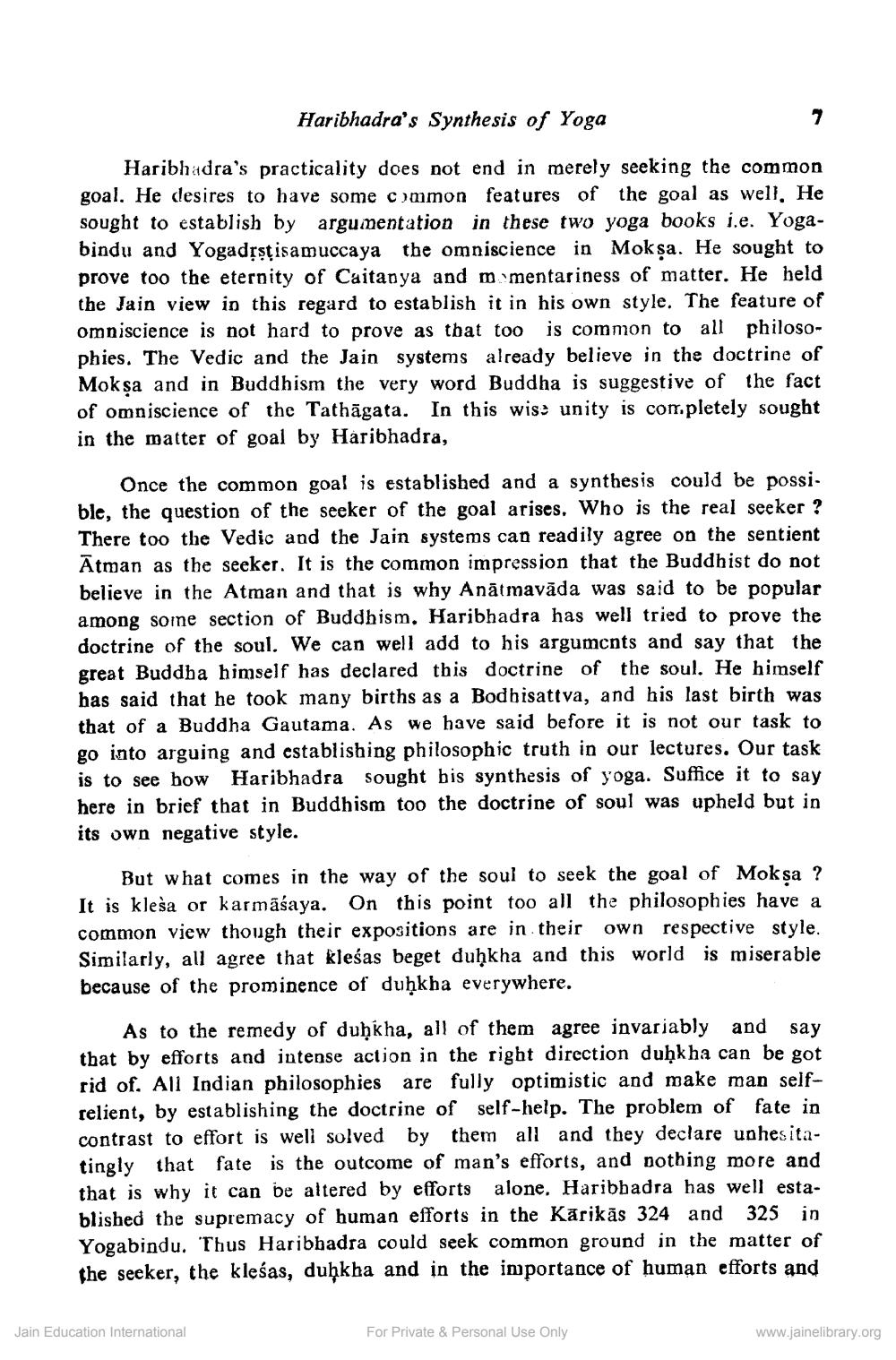Book Title: Sambodhi Author(s): Dalsukh Malvania, H C Bhayani, Nagin J Shah Publisher: L D Indology Ahmedabad View full book textPage 9
________________ Haribhadra's Synthesis of Yoga Haribhadra's practicality does not end in merely seeking the common goal. He desires to have some common features of the goal as well, He sought to establish by argumentation in these two yoga books i.e. Yogabindu and Yogadrstisamuccaya the omniscience in Moksa. He sought to prove too the eternity of Caitanya and m mentariness of matter. He held the Jain view in this regard to establish it in his own style. The feature of omniscience is not hard to prove as that too is common to all philosophies. The Vedic and the Jain systems already believe in the doctrine of Moksa and in Buddhism the very word Buddha is suggestive of the fact of omniscience of the Tathāgata. In this wiss unity is completely sought in the matter of goal by Haribhadra, Once the common goal is established and a synthesis could be possi. ble, the question of the seeker of the goal arises. Who is the real seeker ? There too the Vedic and the Jain systems can readily agree on the sentient Ātman as the seeker. It is the common impression that the Buddhist do not believe in the Atman and that is why Anātmavāda was said to be popular among some section of Buddhism. Haribhadra has well tried to prove the doctrine of the soul. We can well add to his arguments and say that the great Buddha himself has declared this doctrine of the soul. He himself has said that he took many births as a Bodhisattva, and his last birth was that of a Buddha Gautama. As we have said before it is not our task to go into arguing and establishing philosophic truth in our lectures. Our task is to see how Haribhadra sought bis synthesis of yoga. Suffice it to say here in brief that in Buddhism too the doctrine of soul was upheld but in its own negative style. But what comes in the way of the soul to seek the goal of Moksa ? It is klesa or karmāśaya. On this point too all the philosophies have a common view though their expositions are in their own respective style. Similarly, all agree that kleśas beget duhkha and this world is miserable because of the prominence of duhkha everywhere. As to the remedy of duḥkha, all of them agree invariably and say that by efforts and intense action in the right direction duḥkha can be got rid of. All Indian philosophies are fully optimistic and make man selfrelient, by establishing the doctrine of self-help. The problem of fate in contrast to effort is well solved by them all and they declare unhesitatingly that fate is the outcome of man's efforts, and nothing more and that is why it can be altered by efforts alone. Haribbadra has well established the supremacy of human efforts in the Kārikās 324 and 325 in Yogabindu. Thus Haribhadra could seek common ground in the matter of the seeker, the kleśas, duḥkha and in the importance of human efforts and Jain Education International For Private & Personal Use Only www.jainelibrary.orgPage Navigation
1 ... 7 8 9 10 11 12 13 14 15 16 17 18 19 20 21 22 23 24 25 26 27 28 29 30 31 32 33 34 35 36 37 38 39 40 41 42 43 44 45 46 47 48 49 50 51 52 53 54 55 56 57 58 59 60 61 62 63 64 65 66 67 68 69 70 71 72 73 74 75 76 77 78 79 80 81 82 83 84 85 86 87 88 89 90 91 92 ... 304
